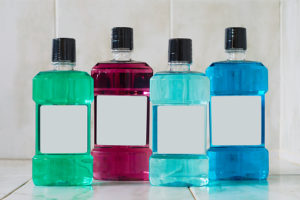Mouthwash or rinse is a liquid that is used before or after brushing your teeth. The liquid is swished around in the mouth for about 30 seconds to 1 minute depending on the mouthwash and then spit out. Mouthwash is helpful to be used as part of your regular oral hygiene care with twice daily brushing and everyday flossing care, and does not replace it. Most people use it to freshen their breath. However, it can help to remove food particles after brushing and available in formulations that can reduce plaque or gingivitis, and prevent tooth decay.
Types of Mouthwash
There are two types of mouthwash: cosmetic and therapeutic. Cosmetic mouthwash may temporarily mask bad breath and leave a pleasant taste. However, cosmetic mouthwash has no chemical or active component beyond the temporary benefits. Therapeutic mouthwash has active ingredients that help to control or reduce conditions like bad breath, gingivitis, plaque, and tooth decay. Active ingredients in mouthwash include: cetylpyridinium chloride, chlorhexidine, fluoride, peroxide, or essential oils. Cetylpyridium chloride maybe added to reduce bad breath, while chlorhexidine and essential oils can be used to control plaque and gingivitis. Fluoride is added to help prevent tooth decay and peroxide is an added whitening agent. Therapeutic mouthwashes is available over-the-counter and by prescription, depending on the additive. Mouthwashes containing essential oils are available in stores, and those with chlorhexidine are available only by prescription.
Choosing the Right Mouthwash
Selecting the right mouthwash for you is important to find one that meets your dental hygiene needs for the health of your teeth and gums, and taste preference. Keep these points in mind:
- Alcohol content – Mouthwash may be formulated with or without alcohol. Alcohol is a component of many mouthwashes, which can be problematic if a large quantity is deliberately swallowed. For mouthwash for the whole family that includes school-aged children or teens, you may want an alcohol-free option. Additionally, recovering alcoholics avoid mouthwashes with alcohol because of the potential for abuse.
- Sensitivity – Mouthwash can be irritating for some people who have gum sensitivity. After dental procedures, mouth and gum sensitivity can be an issue during recovery for a short time. With sensitive mouth and gums, consider using a natural mouthwash containing aloe vera and chamomile for a soothing effect.
- Plaque control – Mouthwashes that not only helps to control bad breath but also prevent plaque build-up on the teeth will contain an anti-plaque ingredient. If you are unsure of which mouthwash to use in your daily oral care to reduce plaque, remember to ask your dentist for suggestions.
Don’t forget to schedule your regular dental check-up with California Dental Group at 800-407-0161 and ask any questions you may have with using a mouthwash with your daily oral care.


